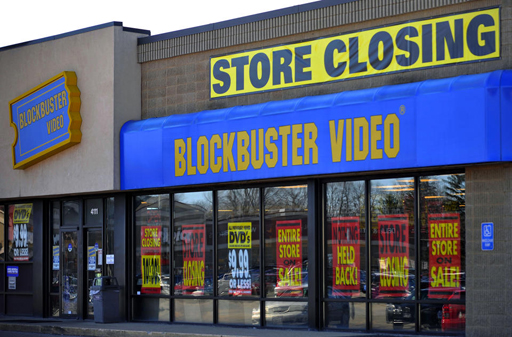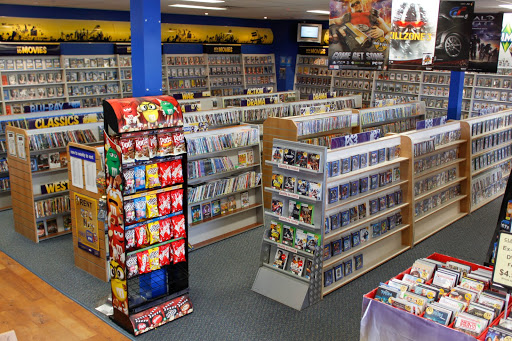It seemed oddly bizarre to hear the news recently that most of the last 300 remaining Blockbuster video rental stores would be closing within a month. Think back to 1985, when the chain became a behemoth that swallowed up an industry that was built upon local mom and pop businesses. Less than a decade later, at its pinnacle in 1994, Viacom bought the chain for a cool $8 Billion. How many of us cannot remember browsing the new releases and waiting in line to check out VHS tapes, later DVD’s, on a Friday or Saturday night? My local store, wedged between a supermarket and a liquor store, remains vacant since it closed about 3 years ago. A year or two afterward, after struggling to survive, the last remaining independent video store chain in our area also succumbed.

The local video store (Pleasant Street Video, in Northampton, Massachusetts) outlasted its monster competitor a mile up the road because it catered to serious film buffs, with an extensive inventory that included independent, fine art, and foreign films. The clerks who worked there loved film, they weren’t simply teenagers asking us if we wanted popcorn and soft drinks to go with our movies. In fact, when the local independent store closed, there was a fundraising campaign that allowed the store’s expansive collection to be acquired by the local public library.
Yes, the video rental industry found itself in the difficult situation of trying to continually adapt to keep up with what was essentially an industrial evolution. Suddenly, there was a second Goliath in the room – Netflix – and Blockbuster was slow to respond to video-by-mail, kiosks, streaming video, and a more customer-centered philosophy. Blockbuster considered itself indomitable. Rather than adapting to a changing competitive marketplace, it grew to 8,000 stores, passed on an opportunity to acquire rival Netflix, and collected as much as $500 Million a year in the late fees that were universally hated by its customers.

More than the changes in the way that Americans watched movies, Blockbuster ultimately failed because it simply didn’t care about its customers … you and me.
With most campgrounds in the United States being individually owned and operated, it is not difficult to see parallels between camping and the video rental industry. Certainly, there have been campground ownership groups that have appeared on the scene, capitalizing upon the leverage and efficiency of centralized business plans, marketing, buying power, and name recognition … not to mention sometimes very deep-pockets.
As campground owners, it is important to learn from the Blockbuster experience. My advice is to run your business in the most customer-centric manner possible. Ask your campers how you can better provide what they really want from their camping experience, then follow through and deliver. Whether it’s free wi-fi, pet-friendly facilities, live entertainment, or new recreational amenities, you need to recognize that resting on your laurels is not going to compensate for even a normal rate of attrition. Go out of your way to make it clear to your existing campers that their interests are your interests, and reach out to new campers by showing them what makes your campground unique. A homogenous Blockbuster-style operation is going to lose its appeal sooner rather than later.
Although family camping appears to be “here to stay”, there are certainly demographic shifts that both individual campground owners and the industry need to address. A generation that has been brought up on computers and video games has not been introduced to the outdoors to the same degree as previous generations. It is imperative that campgrounds find ways of drawing this younger generation into the outdoor experience. Ask Blockbuster – which considered innovations like the Redbox kiosks as insignificant niche markets – about the need to adapt. Hindsight is said to be 20/20. If you bought or built your business back in 1985, I suspect that you happy today that your investment was in a family campground and not a Blockbuster franchise.
Insure the long-term survival of your business by learning valuable lessons from those who have failed, as well as those who succeed, both from within the industry and from industries beyond.
This post was written by Peter Pelland
